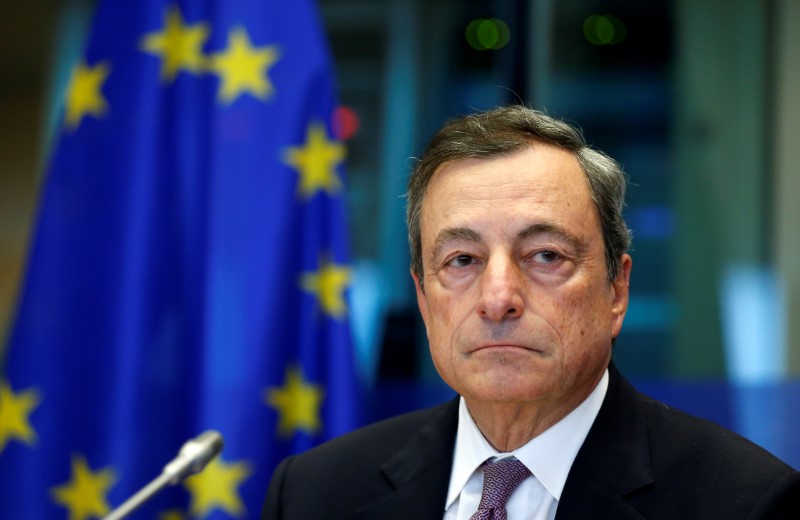
FILE PHOTO – European Central Bank (ECB) President Mario Draghi waits to address the European Parliament’s Economic and Monetary Affairs Committee in Brussels, Belgium September 25, 2017. REUTERS/Francois Lenoir
January 25, 2018
By Balazs Koranyi and Francesco Canepa
FRANKFURT (Reuters) – European Central Bank chief Mario Draghi took a swipe at Washington on Thursday for talking down the dollar, a move he said threatened a decades-old pact not to target the currency and might force his bank to change its own policy.
Singling out the euro’s surge as a source of uncertainty, Draghi said any unjustified move could force the ECB to rethink its strategy as a strong currency could put a lid on inflation, thwarting its efforts to lift prices.
He was speaking after U.S. Treasury Secretary Steven Mnuchin this week said he welcomed a weak dollar because it was good for U.S. trade, and Commerce Secretary Wilbur Ross said “U.S. troops are now coming to the ramparts” in global trade wars.
That sentiment sent the euro to three-year highs against the dollar.
Striking a moderately dovish tone, Draghi also pushed back on rate hike expectations, arguing there was almost no chance of a move this year, even as some investors were betting on a rise as early as December.
But it was his comments on currency that resonnated most from a news conference following the ECB’s regular policy meeting.
“When someone says that basically a good exchange rate is good for exporters and it’s good for the economy and it’s good, that means it’s targeting the exchange rate,” Draghi said when asked about Mnuchin’s comments.
“That agreement (about not targeting the exchange rate), as subtle as you want, has been in place for decades now,” Draghi added.
The ECB is especially sensitive to the euro’s moves as any big rise in the currency could cut into inflation, threatening to reverse the impact of the very stimulus the bank has been providing over the past three years.
The euro had risen, Draghi argued, partly because of “the use of language in discussing exchange rate developments that doesn’t reflect the terms of reference that have been agreed.
“Several members of the Council expressed concern, and this concern was also in a sense was broader than simply the exchange rate, it was about the overall status of international relations right now,” he said.
But Draghi’s comments that part of the euro’s gain may be related to the bloc’s strong economy, pushed the currency to $1.2538, its highest level since December 2014. Even a suggestion that rate hike expectations were premature, only pushed it back marginally, leaving it up nearly 1 percent on the day.
“If all this were to lead to an unwanted tightening of our monetary policy … then we will have to just think about our monetary policy strategy,” Draghi said, with particular reference to the U.S. statements.
The euro now trades 7 percent higher than in December, when the ECB unveiled its latest economic projections, suggesting some downward pressure on import prices.
Having bought more than 2 trillion euros worth of bonds over the past three years, the ECB has almost single-handedly depressed borrowing costs in the euro zone to kick start growth and lift prices.
FEW CHANCES
The purchases, already twice reduced, are set to run until the end of September and investors are betting on their end in the fourth quarter.
While Draghi did not shoot down those expectations, he also argued that inflation has yet to show convincing signs of a sustained rise, a message also aimed at tempering expectations for policy tightening.
“Based on today’s data and today’s projection I see very few chances at all that interest rates will be raised this year,” he said.
Draghi also said that work to rework the bank’s policy guidance, flagged in the minutes of the last meeting, has not really started and there was also no discussion about winding down the asset purchase program.
Earlier in the day, in a widely expected decision, the ECB kept its key interest rate deep in negative territory, maintained a pledge to hold rates steady until well after bond buys conclude and promised to continue asset purchases until a sustained rebound in inflation.
While the euro’s gain so far has only a modest impact on inflation, the worry is that weaker economies on the bloc’s periphery would be affected by it more, a risk to an economic convergence process that restarted only recently.
Part of his holding pattern approach, Draghi also kept the bank’s guidance unchanged, maintaining a promise to continue asset buys until a sustained rebound in inflation, even after policymakers agreed in December to begin work in early 2018 to draft a new guidance.
(Reporting by Balazs Koranyi and Francesco Canepa; Writing by Mark John Editing by Jeremy Gaunt)

